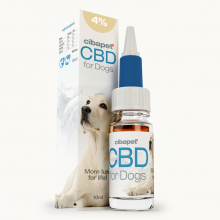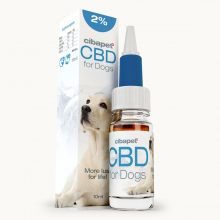CBD for dogs with hip problems
Last updated:
Published:
Is your furry friend struggling with hip problems? Look no further! Hemp extract, hemp seed oil, and nano hemp oil, the natural supplements taking the pet world by storm, could be the answer you've been searching for. With their potential to alleviate discomfort and improve mobility, many pet owners are turning to CBD dog treats as a premium alternative treatment.
Contents:
- Understanding the Causes of Hip Dysplasia in Dogs
- Recognizing Symptoms of Hip Dysplasia in Dogs
- Exploring the Benefits of CBD for Dogs with Hip Dysplasia
- Using CBD Oil for Alleviating Pain and Supporting Hip and Joint Health in Dogs
- Choosing the Best CBD Products for Hip and Joint Support in Dogs
- Comparing CBD Treats and Oils for Canine Hip Dysplasia
- Conclusion
- FAQs
CBD's easy dose format makes it convenient for any dog owner to incorporate hemp extract into their pup's routine. The carefully selected ingredients in CBD products ensure optimal content and effectiveness for picky dogs. By introducing CBD into your larger dog's life, you may witness a significant improvement in their quality of life.
Don't let your beloved pets suffer needlessly from hip problems. Join countless pet owners who have already embraced the power of hemp seed oil. Give your four-legged friend the relief they deserve with CBD dog treats and watch them thrive once again, thanks to the benefits of the hemp plant.

Understanding the Causes of Hip Dysplasia in Dogs
Hip dysplasia is a common condition that affects many pups, especially larger breeds. As responsible pet parents, it's essential to understand the causes of hip dysplasia so that we can take preventive measures and seek appropriate treatment for our furry friends. Arthritis and its side effects are often associated with hip dysplasia in dogs.
Genetic factors play a significant role in the development of hip dysplasia in certain breeds of dogs. German Shepherds, Labrador Retrievers, and Rottweilers, known to be picky dogs, are more prone to this condition due to their genetic makeup. When pet parents breed these pups without considering their genetic predisposition, it increases the likelihood of passing on this condition to future generations of pets.
Improper growth during puppyhood can also contribute to hip dysplasia in pets. Rapid weight gain or excessive exercise at a young age can put stress on the developing joints, leading to abnormal hip joint formation. It's crucial for pet owners to ensure controlled growth and provide appropriate exercise for their puppies, especially in large breed dogs who are more susceptible to hip dysplasia. This will help promote the safety and support needed for pets with arthritis.
Understanding the causes of hip dysplasia in pets allows us to take preventive measures for our furry friends. If you have a pup, especially a breed known for its susceptibility to this condition, consider adopting from reputable breeders who prioritize health testing and responsible breeding practices. By choosing dogs from lines with no history of hip dysplasia, you can significantly reduce the chances of your pup developing this painful arthritis. Support your pet's joint health by making informed choices.
Maintaining a healthy weight is crucial in preventing or managing hip dysplasia in your pup. Excess weight puts strain on the joints and exacerbates any existing arthritis issues. Ensure your pet receives a balanced diet and regular exercise tailored to their specific strengths.
There are several options available:
-
Medications for arthritis: Non-steroidal anti-inflammatory drugs (NSAIDs) can help manage pain and inflammation associated with hip dysplasia in your pup. Consult your veterinarian to determine the most suitable medication and dosage for your pet.
-
Physical therapy: Rehabilitation exercises, hydrotherapy, and massages can help improve muscle strength, flexibility, and overall mobility in dogs with hip dysplasia. This is especially important for pups with arthritis, as it helps manage the pain and discomfort they may experience. If your pet is suffering from hip dysplasia and arthritis, consider incorporating physical therapy into their treatment plan to alleviate their symptoms and improve their quality of life.
-
In severe cases of arthritis in dogs, or when conservative treatments fail to provide relief for your pup, surgical options such as hip replacement or joint reconstruction may be recommended by a veterinary specialist. CBD for dogs can also be considered as a pet-friendly alternative treatment.
Remember that early detection is crucial in managing hip dysplasia effectively in your pup. If you notice any signs of discomfort or difficulty in your pet's movements, consult with your veterinarian promptly for a proper diagnosis and treatment plan for arthritis.
By understanding the causes of hip dysplasia in pups and taking proactive steps to prevent arthritis, we can ensure our pet's well-being. As responsible dog parents, let's prioritize their health by staying informed and seeking appropriate care for any issues that arise on the spectrum.
Recognizing Symptoms of Hip Dysplasia in Dogs
Canine hip dysplasia is a common condition that affects dogs of all sizes and ages. It occurs when the hip joint doesn't develop properly, leading to mobility issues and discomfort for our furry friends. As responsible pet owners, it's crucial to recognize the symptoms of arthritis and hip dysplasia early on so we can provide prompt intervention and management for our pups. Canine hip dysplasia falls within the spectrum of arthritis conditions.
Limping, difficulty getting up or lying down, and decreased activity levels are some of the most noticeable signs of hip dysplasia in dogs. If you notice your pup favoring one leg or showing reluctance to put weight on their back legs, it could be an indication that they are experiencing pain or discomfort in their hips. If your dog seems less active than usual or has trouble performing activities they once enjoyed, such as running or playing fetch, it may be due to underlying hip problems.
Another key symptom to look out for is stiffness, especially after periods of rest or inactivity. Dogs with hip dysplasia often experience stiffness in their hindquarters, making it challenging for them to move around comfortably. You might observe your dog struggling to climb stairs or jump onto furniture due to this stiffness.
Pain is another indicator that your dog may be suffering from hip dysplasia. They may exhibit signs such as whimpering or yelping when touched around their hips or lower back area. It's essential to pay attention to any vocalizations or behavioral changes that suggest your pup is experiencing discomfort.
While these symptoms can occur at any age, they are more commonly observed in senior dogs and larger breeds. However, small dogs can also develop hip dysplasia, so it's important not to overlook these signs based on size alone.
Early recognition of arthritis symptoms allows us to effectively manage our dog's hip health. Consulting with a veterinarian is crucial for diagnosing and treating arthritis. They may recommend medication, physical therapy, weight management, or surgery in severe arthritis cases.
It's worth noting that hip dysplasia can have side effects beyond mobility issues. Over time, the condition can lead to arthritis and further deterioration of the hip joint. By addressing the problem early on, we can potentially minimize these long-term consequences and improve our dog's quality of life.
Exploring the Benefits of CBD for Dogs with Hip Dysplasia
Hip dysplasia is a common condition that affects many dogs, especially larger breeds. It can cause pain, inflammation, mobility issues, and arthritis, making it challenging for our furry friends to enjoy their daily activities. While there are various treatment options available for hip dysplasia and arthritis, one alternative that has gained popularity in recent years is CBD.
Anti-Inflammatory Properties
CBD, or cannabidiol, possesses powerful anti-inflammatory properties that can help reduce inflammation associated with arthritis and hip dysplasia in dogs. Arthritis often leads to discomfort and stiffness in the joints, causing significant pain for our four-legged companions. By targeting inflammatory processes within the body, CBD may alleviate these symptoms and improve overall comfort levels.
Pain Relief through Endocannabinoid System Interaction
Another potential benefit of CBD for dogs with hip dysplasia and arthritis lies in its ability to provide pain relief. The endocannabinoid system (ECS) plays a crucial role in regulating various bodily functions, including pain perception related to arthritis. CBD interacts with receptors within the ECS to modulate pain signals and potentially reduce discomfort caused by hip dysplasia and arthritis.
Research suggests that CBD can activate CB1 and CB2 receptors, which are involved in pain management for dogs with arthritis. By influencing these receptors' activity, CBD may help mitigate the pain experienced by dogs suffering from hip problems.
An Attractive Option for Managing Hip Dysplasia
The health benefits of CBD make it an attractive option for managing hip dysplasia and arthritis in dogs. Unlike some conventional treatments that may come with unwanted side effects or require invasive procedures, CBD offers a more natural approach without compromising on effectiveness.
Many pet owners have reported positive experiences when using CBD products to support their dogs' joint health, especially in cases of arthritis and hip pain. From dog treats infused with CBD to oils specifically formulated for pets with hip issues, there is a wide range of options available on the market today.
When considering using CBD for your dog's hip dysplasia and arthritis, it's essential to consult with your veterinarian. They can provide guidance on the appropriate dosage and help you determine the best course of action based on your dog's specific needs.
Using CBD Oil for Alleviating Pain and Supporting Hip and Joint Health in Dogs
CBD oil has gained popularity as a natural remedy for various health issues, including arthritis, in both humans and animals. Incorporating CBD oil into their daily routine can potentially alleviate arthritis pain, reduce inflammation, and support overall joint health.
Alleviating Pain caused by Hip Problems
One of the primary benefits of using CBD oil for dogs with hip problems is its potential to alleviate pain. Whether your furry friend is suffering from arthritis, hip dysplasia, or other conditions affecting their hips and joints, CBD oil may offer relief.
CBD oil, which can be given orally or added to your dog's food, may help reduce discomfort caused by arthritis. The cannabinoids in the oil interact with receptors in the endocannabinoid system, regulating pain perception. By activating these receptors, CBD may help alleviate hip problems.
Supporting Overall Joint Health
Regular use of CBD oil may also contribute to supporting your dog's overall joint health, especially in cases of arthritis. Inflammation often accompanies hip problems in dogs with arthritis, leading to stiffness and reduced mobility. The anti-inflammatory properties of CBD can help combat this inflammation and promote better joint function for dogs with arthritis.
By reducing inflammation around the affected area, CBD oil can potentially enhance your dog's comfort level and mobility, especially for dogs with arthritis or hip issues. This means they can enjoy activities such as running, walking, or playing without experiencing excessive pain or discomfort, promoting overall hip health.
Incorporating CBD Oil into Your Dog's Wellness Routine
Adding CBD oil to your dog's wellness routine is relatively simple. There are various dog-specific CBD products available on the market that cater specifically to canine needs:
CBD Dog Treats: These treats are infused with CBD oil, making them a convenient way to administer the supplement while also rewarding your furry friend.
CBD Oil Products: Pure forms of CBD oil are available, allowing you to control the dosage and easily add it to your dog's food or administer it orally.
Full Spectrum CBD: Full spectrum CBD oil contains a wide range of cannabinoids, terpenes, and other beneficial compounds that work together synergistically to enhance its effectiveness.
Hemp Seed Oil: Hemp seed oil is rich in essential fatty acids and can be an excellent addition to your dog's diet for overall joint health.
When choosing CBD products for your dog, it's essential to opt for high-quality options from reputable brands. Look for products that undergo third-party testing to ensure purity and potency.
Choosing the Best CBD Products for Hip and Joint Support in Dogs
There are a few important factors to consider. By selecting high-quality, organic CBD products specifically formulated for dogs, you can provide your furry friend with the support they need. Let's explore some key points to keep in mind when choosing the right CBD product.
Look for High-Quality, Organic CBD Products
Quality matters. Opting for high-quality, organic ingredients ensures that you are giving your pet a supplement free from harmful chemicals or additives. Organic picks not only prioritize your dog's well-being but also contribute to sustainable farming practices.
Consider the Concentration of CBD
The concentration of CBD in a product is crucial as it determines its potency and effectiveness. Higher concentrations may be more suitable for dogs experiencing severe hip problems, while lower concentrations may work well as a daily supplement for maintenance purposes. It's essential to consult with your veterinarian to determine the appropriate dosage and concentration based on your dog's specific needs.
Extraction Method Matters
The method used to extract CBD from hemp plants can impact the quality of the final product. CO2 extraction is considered one of the best methods as it maintains the purity of CBD without leaving behind any harmful residues or solvents. This ensures that your dog receives a clean and safe supplement.
Third-Party Lab Testing Provides Assurance
To ensure transparency and safety, look for products that undergo third-party lab testing. These tests verify the potency and purity of the CBD oil, providing you with peace of mind about what you're giving your four-legged companion. A reputable brand will readily provide these lab reports on their website or upon request.
Consult with Your Veterinarian
While CBD can offer great benefits for dogs with hip problems, it's crucial to consult with your veterinarian before introducing any new supplement. They can provide valuable insights into your dog's specific condition and recommend the most suitable CBD product. Your vet will consider factors such as your dog's size, breed, and overall health to ensure you make an informed decision.
Comparing CBD Treats and Oils for Canine Hip Dysplasia
CBD treats and oils are increasingly being used to help manage hip dysplasia in dogs. Both options have their own advantages, so understanding the differences can help you make an informed decision on which one is best for your furry friend.
Convenience and Administration
CBD treats offer a convenient way to administer CBD to dogs with hip dysplasia. These treats come in various flavors that dogs love, making it easier to get them to consume the CBD. They can be given as a snack or incorporated into their regular meals without any hassle. This makes it particularly useful for pet owners who struggle with giving medication orally.
On the other hand, CBD oils provide more precise dosing options and faster absorption into the bloodstream. With a flavorless oil, you can easily mix it into your dog's food or apply it directly under their tongue for faster absorption. This allows for better control over the dosage, which is crucial when managing hip dysplasia symptoms.
Dosage Control and Absorption
CBD oils have an advantage over treats. Oils allow you to measure out the exact amount of CBD needed based on your dog's weight and condition. This precision ensures that your dog receives the right dosage consistently, maximizing its effectiveness in managing hip dysplasia symptoms.
Moreover, dog CBD oils are absorbed more quickly into the bloodstream compared to dog CBD treats. The sublingual application of dog CBD oil allows for rapid absorption through the mucous membranes under the tongue. This means that relief may be experienced faster when using dog CBD oils compared to dog CBD treats.
Fatty Acids Benefits
Both CBD treats and oils offer additional benefits due to their fatty acid content. Fatty acids play a crucial role in maintaining joint health and reducing inflammation associated with hip dysplasia.
CBD treats often contain ingredients like fish oil or hemp seed oil, which are rich in omega-3 fatty acids. These fatty acids have anti-inflammatory properties that can help alleviate pain and promote joint health in dogs with hip dysplasia.
CBD oils, especially those derived from hemp, also contain omega-3 and omega-6 fatty acids. By incorporating these oils into your dog's diet, you can provide them with the necessary nutrients to support their overall joint health.
Conclusion
In conclusion, CBD has shown great potential in helping dogs with hip problems, specifically hip dysplasia. By understanding the causes and recognizing the symptoms of hip dysplasia, pet owners can take proactive measures to alleviate their dogs' pain and improve their overall joint health.
CBD oil has been found to be effective in reducing pain and inflammation associated with hip dysplasia. It can also support the health of the hips and joints, promoting mobility and improving the quality of life for dogs suffering from this condition.
When choosing CBD products for your dog's hip and joint support, it is important to consider factors such as product quality, dosage guidelines, and administration methods. Both CBD treats and oils can be beneficial for canine hip dysplasia; however, it is essential to select high-quality products that are specifically formulated for pets.
To ensure you make an informed decision about CBD products for your dog's hip problems, consider consulting with a veterinarian who specializes in holistic or integrative medicine. They can provide personalized guidance based on your dog's specific needs.
Incorporating CBD into your dog's routine may help alleviate discomfort caused by hip dysplasia while supporting their overall well-being. However, it is important to remember that each dog is unique, so results may vary. It is always recommended to start with a low dosage and monitor your pet's response before making any adjustments.
Take action today by exploring reputable CBD brands that prioritize transparency in their sourcing and manufacturing processes. Look for third-party lab testing results to ensure product safety and potency. With proper research and guidance from professionals, you can make an informed decision that benefits your furry friend.
FAQs
Can I give my dog regular CBD oil for their hip problems?
Yes, you can give your dog regular CBD oil for their hip problems; however, it is crucial to choose a high-quality product specifically formulated for pets. Regular human-grade CBD oil may contain ingredients that could be harmful to dogs.
How long does it take for CBD to start working in dogs with hip dysplasia?
The time it takes for CBD to start working in dogs with hip dysplasia can vary. Some dogs may experience relief within minutes, while others may require several days or weeks of consistent use before noticeable improvements occur. It is essential to be patient and monitor your dog's response.
Are there any side effects of using CBD for dogs with hip problems?
CBD is generally well-tolerated by dogs; however, some potential side effects may include drowsiness, dry mouth, or slight changes in appetite. If you notice any adverse reactions, it is recommended to consult with a veterinarian.
Can I give my dog CBD treats instead of CBD oil for their hip problems?
Yes, you can give your dog CBD treats instead of CBD oil for their hip problems. CBD treats offer a convenient and tasty way to administer cannabidiol while providing the same potential benefits as CBD oil.
Is CBD legal for use in treating hip problems in dogs?
The legality of using CBD for treating hip problems in dogs varies by jurisdiction. It is important to research and comply with local regulations regarding the use of CBD products for pets.














